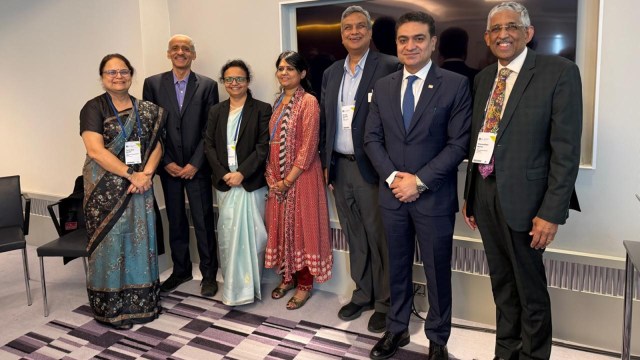From yoga to medicine access: India steps up fight against growing non-communicable disease crisis
More than 101 million Indians are currently living with diabetes, with an additional 136 million who are pre-diabetic.
 A panel of experts at the ongoing World Health Summit, 2025, in Berlin, deliberated on how integrated interventions can help reduce NCDs. (Express Photo)
A panel of experts at the ongoing World Health Summit, 2025, in Berlin, deliberated on how integrated interventions can help reduce NCDs. (Express Photo)From growing evidence on the role of yoga in managing cardiovascular diseases, achieving ABC targets in diabetes care, promoting healthier diets by reducing high-fat, high-sugar, high-salt, and ultra-processed foods, to improving access to antihypertensive medications, a range of strategies are being implemented to tackle India’s escalating non-communicable disease (NCD) crisis.
Dr Sanghamitra Pati, Additional Director General, Indian Council of Medical Research (ICMR), and Dr Tanvir Kaur, Head, International Health Division, who moderated a panel of experts at the ongoing World Health Summit, 2025, in Berlin, deliberated on how integrated interventions can help reduce NCDs.
Dr V Mohan, Chairman, Madras Diabetes Research Foundation, spoke about the need to prevent diabetes-related complications, the importance of achieving the ABC targets, and how to keep HbA1c (blood sugar), blood pressure, and cholesterol under control.
The prevalence of diabetes among India’s young adults has increased, Dr Mohan said, while also referring to the ICMR–INDIAB study, India’s largest epidemiological survey on diabetes, that showed a concerning trend where more than 101 million Indians are currently living with diabetes, with an additional 136 million who are pre-diabetic.
“Alongside clinical management, lifestyle interventions are critical and a healthy diet and increased physical activity can prevent up to at least 50 per cent of new Type 2 diabetes cases,” Dr Mohan added.
Dr Bharati Kulkarni, Director, ICMR-National Institute of Nutrition, also said their surveys had shown that Indian diets lack diversity, with a shift towards processed, high-fat, high-salt, and high-sugar foods, especially in urban areas. Dr Kulkarni also gave a snapshot of how initiatives like Eat Right India and policies aim to reverse the trend through public education, food labelling, and school-based interventions.
During the panel discussion, Dr Manoj Murhekar, Director, ICMR-National Institute of Epidemiology, Chennai, and Head, Epidemiology Division of ICMR, also shared how the India Hypertension Control Initiative (IHCI) had led to significant outcomes in tackling high blood pressure.
IHCI has used tools like the SIMPLE App to track and monitor patients. By 2024, it reached over 5 million people across 157 districts, earning global recognition.
Dr Gautam Sharma, Professor, Cardiology and Head, Centre for Integrative Medicine and Research, All Indian Institute of Medical Sciences, New Delhi, said that yoga is increasingly being recognised not just as a form of exercise but also as a therapeutic modality.
“Major principles behind yoga’s effects on cardiovascular disorders are modulating the autonomic nervous system, reduction of stress and psychological burden and cardiac rehabilitation,” Dr Sharma added.
According to Prof Anurag Agrawal, Dean BioSciences and Health Research, Trivedi School of Biosciences, Ashoka University, India, is also on the brink of a Chronic Obstructive Pulmonary Disorder (COPD) epidemic.
“Low lung function is a major factor in chronic obstructive pulmonary disease, which is now occurring at much younger ages in India. While there is no cure to restore lost lung function, it is possible to slow the decline by promoting healthier habits and early interventions. Unlike sudden events such as heart attacks, COPD progressively suffocates patients over time, making it a silent but deadly threat. To tackle this, digital health solutions can play a key role,” he said.
Agrawal added that digital “vaccines”, behavioural interventions delivered through apps or platforms, could be used to motivate people to adopt and maintain lifestyle changes that protect lung health.








